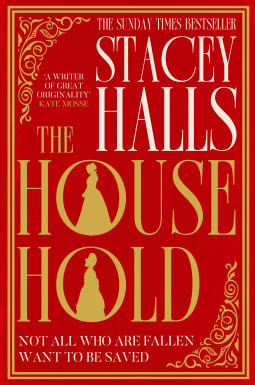About the Book

London, 1847. In a quiet house in Shepherd’s Bush, the finishing touches are being made to welcome a group of young women. The house and its location are secret, its residents unknown to one another, but the girls have one thing in common: they are fallen. Offering refuge for prostitutes, petty thieves and the destitute, Urania Cottage is a second chance at life – but how badly do they want it?
Meanwhile, a few miles away in a Piccadilly mansion, millionairess Angela Burdett-Coutts, one of the benefactors of Urania Cottage, makes a discovery that leaves her cold. Her stalker of ten years has been released from prison, and she knows it’s only a matter of time before their nightmarish game resumes once more.
As the women’s worlds collide in ways they could never have expected, they will discover that freedom always comes at a price . . .
Format: Hardback (385 pages) Publisher: Manilla Press
Publication date: 11th April 2024 Genre: Historical Fiction
Find The Household on Goodreads
Purchase The Household from Bookshop.org [Disclosure: If you buy books linked to our site, we may earn a commission from Bookshop.org, whose fees support independent bookshops]
My Review
As the author explains in her Historical Note, The Household has its basis in historical fact. Charles Dickens, and his friend Angela Burdett-Coutts, really did establish a home for ‘fallen’ women. Described by the author as ‘a halfway house between a refuge and a social experiment’, the intention was that the women – “rescued” from jails, hospitals and workhouses – would be educated, trained for domestic service and then sent to start a new life overseas.
In the book, Dickens stays pretty much in the shadows making only infrequent visits to Urania Cottage in order to record the women’s life stories. One can imagine these forming the basis for some of the female characters in his novels: prostitutes, thieves, women betrayed or reduced to penury. However, he becomes the unwitting accomplice to a deception later in the book.
To outward appearances Angela Burdett-Coutts has everything. She’s extremely wealthy, lives in a magnificent house, possesses a wardrobe of beautiful gowns, and has a glittering circle of acquaintances. Her life experiences are far removed from those of the women of Urania Cottage. Although well-intentioned, her desire to have them learn to play musical instruments or master foreign languages shows just how out of touch she is. But in a way she’s trapped too, by an obsessive stalker who has made her life a misery and means she must be protected not just when she leaves her house but at home too. Interestingly, she has something like an obsession of her own, with a man she counts as a friend but would like to be something more.
Life at Urania Cottage follows a strict and ordered regime but is humane compared with what the women have experienced before: comforts such as clean linen, plentiful and nourishing food, hot water to wash in. The house is presided over by the extremely efficient Mrs Holdsworth who, although at first sight appearing rather stern, has the women’s best interests at heart. She proves this through the course of the book, especially when tragedy strikes as she knows what it’s like to suffer loss.
Although we meet a number of the occupants of Urania Cottage, the book focuses mainly on two of the women: Martha and Josephine. The circumstances that have brought them to Urania Cottage are different but they have both found themselves on the margins of society. Martha is desperately searching for her sister Emily who has unaccountably disappeared from her situation as a maid in a wealthy household. Josephine has also been parted from someone she cared for, someone she believed cared for her. Although very different in character, they form a bond and, during the course of the book, both experience moments of desperation that see them make unwise choices.
The men in the book are not particularly pleasant characters, with the honourable exception of Frank, Mrs Holdsworth’s son, who plays a pivotal role towards the end of the book. But there are unattractive female characters too: brothel keepers, procuresses and stern prison warders.
The author cleverly brings together the different threads of the story at the end of the book giving us a glimpse of a more hopeful future for some of the women even if that means them leaving everything – and everyone – they have known behind.
The Household with its rich cast of characters, skilfully crafted storyline and authentic period detail is a thoroughly engrossing and enjoyable historical novel.
I received an advance reader copy courtesy of Manilla Press via Readers First.
In three words: Absorbing, intriguing, affecting
Try something similar: Lily by Rose Tremain
About the Author

Stacey Halls was born in Lancashire and worked as a journalist before her first novel, The Familiars, was published in 2019. The Familiars was the bestselling debut hardback novel of 2019, won a Betty Trask Award and was shortlisted for the British Book Awards Debut Book of the Year. The Foundling, her second, was a Sunday Times bestseller, as was her third, Mrs England. Mrs England was longlisted for the Portico Prize, the Walter Scott Prize and won the Women’s Prize Futures Award. The Household is her fourth novel.



